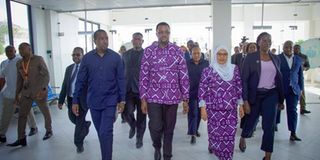ACT Wazalendo pledges land, resource reforms in manifesto

What you need to know:
- In its 2025 election manifesto, the party describes land as “life” and the foundation of national wealth, calling for bold reforms in land management, mining, energy, conservation, and tourism.
Dar es Salaam. ACT Wazalendo has unveiled a sweeping plan to overhaul Tanzania’s land and natural resource policies, vowing to put citizens at the centre of ownership and benefits while ensuring transparency and sustainability.
In its 2025 election manifesto, the party describes land as “life” and the foundation of national wealth, calling for bold reforms in land management, mining, energy, conservation, and tourism.
It stresses that resources must fuel the development of all Tanzanians, not only foreigners or a privileged few.
A key plank is reversing what the party calls “arbitrary privatisation” of land, with a pledge to reclaim areas taken from communities without proper consultation or compensation.
It promises to return village land converted into protected areas, allocating it to farmers and pastoralists to end decades-long conflicts.
Idle or abandoned land would be repossessed and allocated to youth and vulnerable groups for productive use.
A National Commission would be created to review and redraw land boundaries with full public participation.
Through a proposed “Land for Equity” model, citizens would hold shares in investment projects developed on their land.
The manifesto also commits to scrapping land surveying fees, placing full responsibility for surveying and titling in government hands.
It sets limits on ownership, demands active land use, and calls for constitutional recognition of land rights for stronger protection.
Customary ownership would carry the same legal weight as formal titles, while laws permitting non-citizens to own land would be abolished. Leaders implicated in illegal transfers would face tough penalties.
Resources
The party also proposes sweeping changes in how Tanzania manages its mineral, oil, and gas wealth.
It suggests shifting from the current licensing system to an “ownership and contracting” model, where the state and citizens retain ownership and investors act solely as contractors.
All past, present, and future contracts would be published, and no mining licence granted without consent from the affected village. Every contract would be reviewed to safeguard public interests.
Communities near mining sites would receive ten percent of mineral royalties, while firms would be compelled by law to channel three percent of profits directly to host communities.
The party pledges tax cuts for small-scale miners and longer licence terms of up to 10 years.
Strategic projects such as Mchuchuma, Liganga, Kabanga Nickel, and the LNG plant would be prioritised to maximise jobs, domestic revenues, and foreign exchange earnings.
Conservation
Conservation policies would be restructured, with the party accusing current laws of abuse and human rights violations.
Wildlife and forestry protection would shift from a military-style approach to a citizen-centred service.
The Ngorongoro Conservation Area Authority (NCAA) would be dissolved and replaced by a joint company owned by residents and the government.
The manifesto promises to halt protected area expansion, review boundaries, and raise compensation for wildlife damage to at least Sh2 million.
More wildlife officers would be deployed, with modern methods introduced to curb human–wildlife conflict.
Community-based conservation would be strengthened for forests, wildlife, and indigenous lands, while coastal communities would be empowered to safeguard beaches, mangroves, and reefs.
The party also pledges to build seawalls to prevent erosion and cushion climate change impacts, while halting the privatisation of marine and island areas.
A vision for tourism
Tourism, the party argues, should be restructured to ensure more revenue remains in-country.
The current “package safari” system, where payments are made abroad, would be replaced with a “back-pack safari” model where transactions occur locally.
Hotels would be linked with local farming, fisheries, and livestock so that 90 percent of supplies come from Tanzanian producers.
Rural tourism would be promoted through councils and village-level initiatives, while the sector would be aggressively marketed to attract 10 million visitors.
Tourist site infrastructure would be improved for safety and access, multiple fees streamlined, and new tourism corridors in the southern highlands and coast would be developed.
Marine, conference, educational, and medical tourism would be promoted, targeting over 2.5 million jobs and better conditions for guides and service workers.
For ACT Wazalendo, the land and resource agenda is as much political as economic.
By calling for constitutional guarantees, greater community ownership, and full contract transparency, the party positions itself as a challenger to decades of what it sees as opaque, unequal governance of national wealth.
Leaders argue that without reclaiming control over land, minerals, forests, and marine assets, Tanzania risks remaining resource-rich but outcome-poor.
“Our resources should be a blessing for every Tanzanian, today and for future generations,” declares the manifesto.
Whether this far-reaching vision resonates with voters remains to be seen.
But with land disputes, mining conflicts, and conservation tensions still making headlines, the promise of putting citizens first in resource management is likely to strike a powerful chord on the campaign trail.




